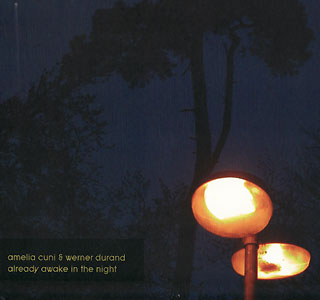
 |
|
 |
Format: LP Label & Cat.Number: Ini.Itu # 1003 Release Year: 2011 Note: the Indian Raga-singer AMELIA CUNI (known from collaborations with ALIO DIE) with Berlin-based minimalist WERNER DURAND, and DAVID TRASOFF on Sarod. Pure contemplation sounds, sine-waves merge with AMELIA CUNIs unique chants..
Price (incl. 19% VAT): €12.50 Warning: Currently we do not have this album in stock!
More Info\"ini.itu is releasing a new vinyl only LP, composed by Amelia Cuni & Werner Durand, with David Trasoff.• Werner Durand is coming from the minimalist tradition. He performs his own music for saxophones, Iranian ney and self-made wind instruments since the late seventies, instruments which he enriched through a variety of materials and playing techniques, including digital delays, providing rich textures and ecstatic rhythms. He also started building wind instruments out of plexi-glass and PVC in the early 80s, which led to the foundation of the ensemble The 13th Tribe in 1990. He was a member of Arnold Dreyblatt\'s Orchestra of Excited Strings and has collaborated with numerous composers/performers including David Behrman, David Moss, Muslimgauze, Henning Christiansen, David Toop, David Maranha and Ulrich Krieger. • Amelia Cuni is a singer, composer and performer who has trained in the tradition of dhrupad singing. She studied in North India for more than 10 years, between 1978 and 1997, under the guidance of the renowned masters R.Fahimuddin Dagar, Dilip Chandra Vedi and Bidur Mallik. Presently, she is engaged in preserving and fostering dhrupad music as well as integrating various artistic traditions with new tendencies. Her present work includes early and contemporary music, multimedia and original compositions in collaboration with artists such as Terry Riley, David Toop, Maria Jonas a.o. She lives in Berlin with Werner Durand and teaches Indian singing at the Vicenza Conservatory in Italy. • David Trasoff is a senior disciple of the late Ustad Ali Akbar Khan (1922 - 2009). with whom he studied sarode performance and North Indian classical music since 1973. He has also received guidance from renowned sarode performer Dr. Rajeev Taranath. His recordings include a CD of North Indian classical music recorded with Ustad Zakir Hussain. The music on this LP is based on the Hindustani Raag Lalit and its modulation to Raag Todi. Lalit is performed in the early morning before sunrise, Todi later on, after sunrise. Here, they are both played against a background of sine waves tuned to the raag’s intervals and going through subtle phase shifting. The restrained sinewaves tapestry, ornamented with Amelia Cuni’s voice and David Trasoff’s sarode result in a music which is radiating an austere peacefulness, verging on the hypnotic and the soothing, on the inner side intimately spiritual, on the outer side confidently elegant.\" [label info] www.iniitu.net \"Ini.itu releases music that deals with Indonesia, but on this new release expands its horizon to India. It combines the wind instruments of Werner Durand (who also gets credit for sine waves, phase shifters and digital delays) with the voice of Amelia Cuni, who also plays on two pieces (out of three) bamboo resonator. On the same two pieces David Trasoff plays sarod. Durand started out with the 13th Tribe, who played ethnic music on self-built instruments, while Cuni is a trained singer of Dhrupid music, which she has studied for ten years in North India. This album, one track on side A, two on side B, is one of utter minimalism. The singing seems wordless to me, while the sarod slides every now and then, and Duran waves a bed of tones to go along. To say not much is happening is probably an understatement. On the surface the music is almost like a stand-still. The most active component is the voice, and then probably only in \'Morning Surge\', which sounds like an improvised tone poem, embedded however in the slow moving sine waves from Durand. Yet, I think this is a record of great beauty. Very austere, very minimal, but full of captivating beauty. An excellent example of Indian music that is connected well to the history of Western minimal music. No rhythms, but an excellent tone poem. Music with great style.\" [FdW/Vital Weekly] |
| © 2007 Drone Records | | Celler Strasse 33, 28205 Bremen, Germany | Privacy and cookies policy | Impressum / Allgemeine Geschaftsbedingungen / Haftungsausschluss | Links to the scene |